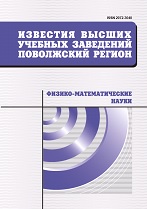|
Physics
A modified approach for accounting dissipation in theoretical description of the complex nuclei fusion
I. I. Gonchara, M. V. Chushnyakovab
a Omsk State Transport University, Omsk
b Omsk State Technical University, Omsk
Abstract:
Background. The process of the complex nuclei fusion is of significant interest as an example of the collective nuclear motion of large amplitude as well as a route for synthesis of new superheavy chemical elements. This process is accompanied by the dissipation of collective motion energy, at least at the last stage. The dissipative nature of fusion is accounted for in many theoretical approaches. In the present work, we propose a modified method for accounting for dissipation. Materials and methods. The main idea is to use the superfluid model for evaluating nuclear temperature, not the fermi gas model like in previous approaches. The calculations of the cross sections are performed for reaction $^{16}$O$+^{92}$Zr at the collision energies ranging from 46 up to 70 MeV. Results. For this reaction and at these conditions it turns out, that the more complicated superfluid model results in the cross sections which are indistinguishable from the ones obtained using the much simpler Fermi-gas model.
Citation:
I. I. Gonchar, M. V. Chushnyakova, “A modified approach for accounting dissipation in theoretical description of the complex nuclei fusion”, University proceedings. Volga region. Physical and mathematical sciences, 2023, no. 2, 77–90
Linking options:
https://www.mathnet.ru/eng/ivpnz535 https://www.mathnet.ru/eng/ivpnz/y2023/i2/p77
|

| Statistics & downloads: |
| Abstract page: | 40 | | Full-text PDF : | 20 | | References: | 20 |
|




 Contact us:
Contact us: Terms of Use
Terms of Use
 Registration to the website
Registration to the website Logotypes
Logotypes








 Citation in format
Citation in format 